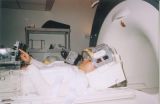(Press-News.org) Gaining just five pounds can increase your blood pressure, according to a study presented at the American Heart Association's High Blood Pressure Research Scientific Sessions 2014.
Many people understand the health dangers of large amounts of extra body weight, but reasearchers in this study wanted to see the impact of a small weight gain of about five to 11 pounds.
"To our knowledge, for the first time, we showed that the blood pressure increase was specifically related to increases in abdominal visceral fat, which is the fat inside the abdomen," said Naima Covassin, Ph.D., the study's lead author and a research fellow at the Mayo Clinic in Rochester, Minn. "Our research suggests that healthy people who are more likely to gain weight in the stomach area are also more likely to have their blood pressure increased."
At the beginning of the eight-week study, a 24-hour monitor tested the blood pressure of 16 normal weight people. Researchers fed them an extra 400 to 1,200 calories each day with their choice of an ice cream shake, chocolate bar or energy drink to increase their weight by about 5 percent. Afterwards, their blood pressure was taken for another 24-hour period. Their results were compared to 10 normal weight, healthy people who maintained the same weight over the eight weeks. Researchers found:
Those who gained weight had a systolic blood pressure (top number) increase from an average 114 mm Hg to an average 118 mm Hg.
Those who gained more weight inside their abdomen had a greater blood pressure increase.
A five to 11 pound weight gain didn't change cholesterol, insulin or blood sugar levels.
The study was conducted in healthy people ages 18-48. Further studies will need to be conducted to see if the results are similar in different age groups, those with a family history of high blood pressure and other groups, Covassin said.
"The public awareness of the adverse health effects of obesity is increasing; however, it seems most people are not aware of the risks of a few extra pounds," Covassin said. "This is an important finding because a five- to seven-pound weight gain may be normal for many during the holiday season, the first year of college or even while on vacation."
INFORMATION:
Co-authors are Prachi Singh; Fatima H. Sert-Kuniyoshi; Abel Romero-Corral; Diane E Davison; Francisco Lopez-Jimenez; Michael D. Jensen; and Virend K. Somers.
The National Institutes of Health and the American Heart Association funded the study.
Additional Resources:
Follow #HBPR14 on Twitter for conference news and updates.
Blood pressure photos are available on the right column of this news release link: http://newsroom.heart.org/news/small-weight-gain-can-raise-blood-pressure-in-healthy-adults?preview=6e41caf406ad9129f1ed34daf58ea6ac
For high blood pressure tools and information visit heart.org/hbp.
For the latest heart and stroke news, follow us on Twitter @HeartNews.
Note: Actual presentation is 4 p.m. PT / 7 p.m. ET Wednesdsay, Sept. 10, 2014.
Statements and conclusions of study authors that are presented at American Heart Association scientific meetings are solely those of the study authors and do not necessarily reflect association policy or position. The association makes no representation or warranty as to their accuracy or reliability. The association receives funding primarily from individuals; foundations and corporations (including pharmaceutical, device manufacturers and other companies) also make donations and fund specific association programs and events. The association has strict policies to prevent these relationships from influencing the science content. Revenues from pharmaceutical and device corporations are available at http://www.heart.org/corporatefunding.
For Media Inquiries: (214) 706-1173
Maggie Francis: (214) 706-1382; Maggie.Francis@heart.org
Julie Del Barto (broadcast): (214) 706-1330; Julie.DelBarto@heart.org
For Public Inquiries: (800) AHA-USA1 (242-8721)
heart.org and strokeassociation.org
Small weight gain can raise blood pressure in healthy adults
American Heart Association meeting report abstract 29
2014-09-10
ELSE PRESS RELEASES FROM THIS DATE:
Using plants to produce enzyme may provide treatment for high blood pressure in lungs
2014-09-10
Using plant leaves to produce and deliver a key enzyme may improve treatment for life-threatening high blood pressure in the lungs, according to a study presented at the American Heart Association's High Blood Pressure Research Scientific Sessions 2014.
"Current therapies for pulmonary hypertension don't cure the underlying disorder and the long-term prognosis is poor, even with treatment," said Vinayak Shenoy, Ph.D., the study's lead author and an assistant research scientist at the University of Florida in Gainesville. "There is an urgent need to discover potential ...
Restricting calories may improve sleep apnea, blood pressure in obese people
2014-09-10
— Restricting calories may improve obstructive sleep apnea and reduce high blood pressure in obese adults, according to a study presented at the American Heart Association's High Blood Pressure Research Scientific Sessions 2014.
People with sleep apnea may experience pauses in breathing five to 30 times per hour or more while sleeping. It prevents restful sleep and is associated with high blood pressure, arrhythmia (abnormal heart rhythm), stroke and heart failure.
In a 16-week ramdomized clinical trial, researchers analyzed 21 obese people 20-55 years old with a history ...
Can your blood type affect your memory?
2014-09-10
MINNEAPOLIS – People with blood type AB may be more likely to develop memory loss in later years than people with other blood types, according to a study published in the September 10, 2014, online issue of Neurology®, the medical journal of the American Academy of Neurology.
AB is the least common blood type, found in about 4 percent of the U.S. population. The study found that people with AB blood were 82 percent more likely to develop the thinking and memory problems that can lead to dementia than people with other blood types. Previous studies have shown that people ...
Angling chromium to let oxygen through
2014-09-10
RICHLAND, Wash. -- Researchers have been trying to increase the efficiency of solid oxide fuel cells by lowering the temperatures at which they run. More efficient fuel cells might gain wider use in vehicles or as quiet, pollution-free, neighborhood electricity generating stations. A serendipitous finding has resulted in a semiconducting material that could enable fuel cells to operate at temperatures two-thirds lower than current technology, scientists reported August 18 in Nature Communications.
In an attempt to create a metal oxide with the properties of metal, researchers ...
Association between sunshine and suicide examined in study
2014-09-10
Lower rates of suicide are associated with more daily sunshine in the prior 14 to 60 days.
Light interacts with brain serotonin systems and possibly influences serotonin-related behaviors. Those behaviors, such as mood and impulsiveness, can play a role in suicide.
The authors examined the relationship between suicide and the duration of sunshine after mathematically removing seasonal variations in sunshine and suicide numbers. They analyzed data on 69,462 officially confirmed suicides in Austria between January 1970 and May 2010. Hours of sunshine per day were ...
Study examines vitiligo, alopecia areata and chronic graft vs. host disease
2014-09-10
Vitiligo (depigmentation of the skin) and alopecia areata (AA, patchy or complete hair loss) in patients with chronic graft-vs-host disease (GvHD) following a stem cell transplant appear to be associated with having a female donor and the sex mismatch of a female donor and male recipient.
GvHD is a frequent complication of donor stem cell transplants because donor cells can attack the recipient's body and cause death and other illnesses. The skin is the most commonly affected organ. The underlying biology of chronic GvHD has not been fully explained. The authors ...
'Green wave' explains migratory bird routes
2014-09-10
Ithaca, N.Y.—Migratory songbirds enjoy the best of both worlds—food-rich summers and balmy winters—but they pay for it with a tough commute. Their twice-a-year migrations span thousands of miles and are the most dangerous, physically demanding parts of their year.
Surprisingly, for many North American species the best route between summer and winter homes is not a straight line, according to new research published in the Proceedings of the Royal Society B. In spring, the study shows, birds follow areas of new plant growth—a so-called "green wave" of new leaves and numerous ...
York U neuroscientists decode brain maps to discover how we take aim
2014-09-10
TORONTO, Sept. 10, 2014 - Serena Williams won her third consecutive US Open title a few days ago, thanks to reasons including obvious ones like physical strength and endurance. But how much did her brain and its egocentric and allocentric functions help the American tennis star retain the cup?
Quite significantly, according to York University neuroscience researchers whose recent study shows that different regions of the brain help to visually locate objects relative to one's own body (self-centred or egocentric) and those relative to external visual landmarks (world-centred ...
Happy Camp Fire in California and 790 Fire in Oregon
2014-09-10
The 790 Fire in Oregon began as a lightning strike on July 31, 2014. Over 3,000 acres have been affected by this fire which is 54% contained. In the next 12 to 48 hours there is a potential risk to Sky Lakes Wilderness and natural resources including the Northern Spotted Owl habitat, Coho habitat, water quality, the Pacific Crest Trail, and Cherry Creek Research Natural Area. Area and trail closures exist on the Pacific Crest Trail. The weather is not helping the fire fighters with gusty winds and low relative humidity. The operational objectives include keeping the ...
Diverse neighborhoods may help infants' social learning
2014-09-10
Experiencing diverse communities by hearing different languages at the park, on a bus or in the grocery store may make babies more open-minded in their social learning, a new study finds.
While previous research has shown that direct interactions with parents and caregivers shape early cognitive development, the influence of the broader community beyond those direct experiences has not been as carefully examined. In a new study published by the journal Cognition, University of Chicago Psychology Department researchers investigated whether the variety of languages in infants' ...
LAST 30 PRESS RELEASES:
Don’t Panic: ‘Humanity’s Last Exam’ has begun
A robust new telecom qubit in silicon
Vertebrate paleontology has a numbers problem. Computer vision can help
Reinforced enzyme expression drives high production of durable lactate-based polyester
In Rett syndrome, leaky brain blood vessels traced to microRNA
Scientists sharpen genetic maps to help pinpoint DNA changes that influence human health traits and disease risk
AI, monkey brains, and the virtue of small thinking
Firearm mortality and equitable access to trauma care in Chicago
Worldwide radiation dose in coronary artery disease diagnostic imaging
Heat and pregnancy
Superagers’ brains have a ‘resilience signature,’ and it’s all about neuron growth
New research sheds light on why eczema so often begins in childhood
Small models, big insights into vision
Finding new ways to kill bacteria
An endangered natural pharmacy hidden in coral reefs
The Frontiers of Knowledge Award goes to Charles Manski for incorporating uncertainty into economic research and its application to public policy analysis
Walter Koroshetz joins Dana Foundation as senior advisor
Next-generation CAR-T designs that could transform cancer treatment
As health care goes digital, patients are being left behind
A clinicopathologic analysis of 740 endometrial polyps: risk of premalignant changes and malignancy
Gibson Oncology, NIH to begin Phase 2 trials of LMP744 for treatment of first-time recurrent glioblastoma
Researchers develop a high-efficiency photocatalyst using iron instead of rare metals
Study finds no evidence of persistent tick-borne infection in people who link chronic illness to ticks
New system tracks blockchain money laundering faster and more accurately
In vitro antibacterial activity of crude extracts from Tithonia diversifolia (asteraceae) and Solanum torvum (solanaceae) against selected shigella species
Qiliang (Andy) Ding, PhD, named recipient of the 2026 ACMG Foundation Rising Scholar Trainee Award
Heat-free gas sensing: LED-driven electronic nose technology enhances multi-gas detection
Women more likely to choose wine from female winemakers
E-waste chemicals are appearing in dolphins and porpoises
Researchers warn: opioids aren’t effective for many acute pain conditions
[Press-News.org] Small weight gain can raise blood pressure in healthy adultsAmerican Heart Association meeting report abstract 29



